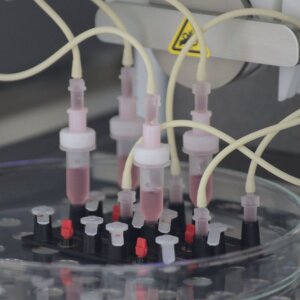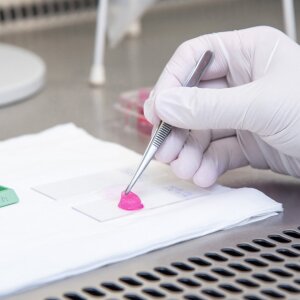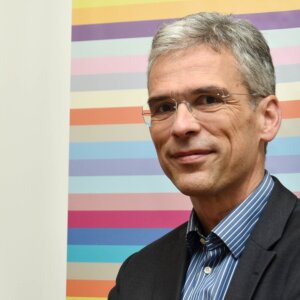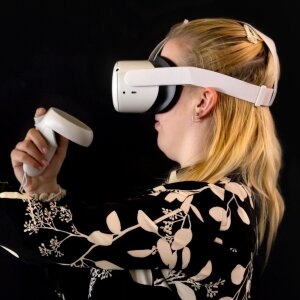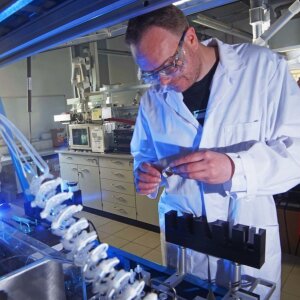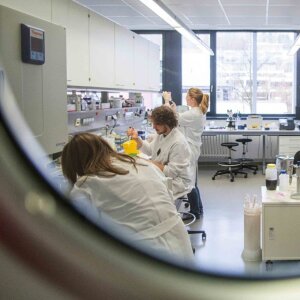New Projects
New test systems for vaccines
The INSPIRE team develops physiological infection models of human organs.
Image: AG INSPIRE/UKJResearch team at the University hospital develops models for testing the efficacy of vaccines
The rapid development of COVID-19 vaccines has shown that biomedical and data science innovations can open up new avenues for vaccine development. The »Inno4Vac Alliance«, which has now been launched, aims to accelerate these innovations in a targeted manner. One partner in the network is the »INSPIRE« working group, led by PD Dr Alexander Mosig at the Institute of Biochemistry II of the University Hospital.
The team uses stem cells to develop physiological models of human organs that reproduce the interaction with immune cells. This should enable predictions of the immune response and vaccine efficacy. The »INSPIRE« working group is funded with about 800,000 euros as part of a public-private partnership with 41 partners from eleven European countries. [vdG]
Skin model replaces animal testing
New 3D skin infection model tests the efficacy of antimicrobial wound healing products.
Image: Heiko Hellmann/UKJResearchers at the University hospital develop a test method for antimicrobial wound healing products
The research laboratory of the Clinic for Skin Diseases of the University hospital is working on practical skin infection models and reproducible procedures with which skin injuries can be simulated. In cooperation with a business partner, the researchers led by PD Dr Cornelia Wiegand are currently developing a standardised test procedure for the effectiveness of antimicrobial wound healing products as an alternative to previous animal testing. The »InVitroWund« cooperation project funded by the Federal Ministry for Economic Affairs and Energy uses a three-dimensional model of human skin that completely replicates the epidermis and dermis and shows central functions of the organ as well as its reactions. The aim is to create an environment in the artificial skin that is as similar as possible to a real wound. [vdG]
Stress relief
Stroking calms and helps to relieve stress.
Image: Anne Günther (University of Jena)Study investigates whether stroking makes nerve fibres grow
Humans have a special sense with which they can perceive emotion-driven physical contact via C-tactile nerve fibres. But, at what age are these special nerve fibres sufficiently developed to perceive touch? Scientists know that the C-tactile nerve fibres are already functional in newborns. But from which developmental period before the actual birth they are fully mature is unknown so far. Psychologists from the University of Jena led by Prof. Dr Ilona Croy and physicians from Jena and Dresden want to find this out over the next three years together with colleagues in France, Norway and Hungary and thereby possibly develop a method that helps premature babies to reduce stress. The German Aerospace Centre is supporting the project »PreTouch—Tactile-Sensory Impairment of C-LTMR Afferences in Premature Babies and Intervention Approaches« with around 1.1 million euros. [sh]
Eastern Europe
Prof. Dr Joachim von Puttkamer examines the question of constitutionalism in Eastern Europe.
Image: Anne Günther (University of Jena)Historians research illiberal democracies in East Central Europe
In some countries of East Central Europe, governments have established that quite offensively propagate an illiberal version as their own variety of democracy and change the respective states accordingly—above all Poland and Hungary. Together with colleagues from Erfurt, Budapest and Warsaw, as well as from the Czech Academy of Sciences in Prague, Eastern Europe experts led by Prof. Dr Joachim von Puttkamer (photo) want to explore what understanding of the constitution underlies this development, what lines of tradition it builds on and what it means for the rest of Europe. The Volkswagen Foundation is supporting the international project »Towards Illiberal Constitutionalism in East Central Europe: Historical Analysis in Comparative and Transnational Perspectives« within the framework of its funding programme »Challenges for Europe« with almost 1.5 million euros over the next four years. [sh]
The virtual classroom
A test person during an experiment in the virtual classroom.
Image: Jens Meyer (University of Jena)Educational study on the use of VR headsets in teacher training
Digital learning has received a lot of attention during the coronavirus pandemic. Jena educational scientist Prof. Dr Alexander Gröschner is picking up this thread in a new research project. Together with colleagues from Finland, Israel, Turkey and the USA, he is investigating in the first transnational study on this subject how virtual reality can enrich teacher training—and thus also enhance teaching in schools. The researchers are supported by the European Association for Research on Learning and Instruction (EARLI) and the Jacobs Foundation. For the study, participants enter simulated classrooms using VR headsets and can try out different forms of teaching and content. Meanwhile the researchers observe their movements and reactions. Afterwards, the participants record their experiences. [sh]
Digital chemistry studies
The funded project will expand the practical synthesis courses.
Image: Jan-Peter Kasper (University of Jena)New project aims to deepen advantages of digital teaching in chemistry studies
Hybrid teaching formats have increasingly found their way into everyday teaching in recent years. The University of Jena does not want to do without their advantages even after the pandemic and actually wants to develop them further. The project »Automatic synthesis and online monitoring of reactions in the chemical practical course using cloud applications«, which is led by the chemists Prof. Dr Timm Wilke and Prof. Dr Ulrich S. Schubert, is now being supported by the Chemical Industry Fund for one year with 25,000 euros. The project will expand the practical laboratory synthesis courses. Specifically, reactions will be automated in a synthesis robot and monitored online with the LabPi measuring system. The obtained data will then be transferred to an associated cloud whose software enables an evaluation. [AB]
Innovation
How do innovations develop? Here is a look into a laboratory at the Centre for Innovation Competence.
Image: Anna SchrollProject launch on innovations with European alliance
Together with its partners in the EC2U university alliance, the University of Jena was able to successfully acquire the project »Research and Innovation for Cities and Citizens« (RI4C2), funded by the EU with around two million euros. The project seeks to promote a pan-European knowledge ecosystem and provide impetus for research and innovation in the universities and cities. The aim is to position the EC2U network as a pioneer and driver of innovation. The University of Jena is primarily responsible for the topic of innovation. The EC2U consortium consists of seven universities that have education and research as common guidelines: the University of Coimbra, the University Alexandru Ioan Cuza in Iaşi, the University of Jena, the University of Pavia, the University of Poitiers, the University of Salamanca and the University of Turku. [Strauss/Hillinger]
South Caucasus
The research team also includes doctoral students Veronika Pfeilschifter (l.) and Irena Gonashvili.
Image: Jens Meyer (University of Jena)Researchers analyse foreign policy of the European Union
For decades, the European Union's foreign policy aimed at institutionalisation and transformation, through which it directly sought to solve problems and conflicts in its neighbouring regions. However, this approach was not as successful as hoped. Therefore, the EU changed course in 2016 and is now trying to make individual states more robust from within and strengthen their resilience. A team from the Institute for Slavic and Caucasian Studies at the University of Jena is analysing the impact of the new strategy on the states of the South Caucasus in a project. The Federal Ministry of Education and Research is funding the project ›Resilience in the South Caucasus: prospects and challenges of a new EU foreign policy concept‹, in which doctoral students Veronika Pfeilschifter (l.) and Irena Gonashvili are participating, with around 900,000 euros over the next three years. [sh]
